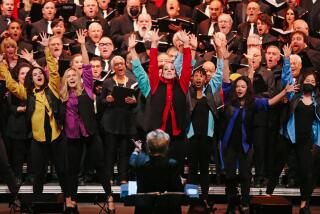Cantata charms -- and jigs into the afterlife
- Share via
Bach’s “It is Enough” Cantata (No. 82, “Ich habe genug”) continues to fascinate and disturb. New recordings continually surface, and the ever-inventive director Peter Sellars even devised a provocative staging for Lorraine Hunt Lieberson at Lincoln Center in 2001, presenting the incomparable mezzo-soprano as a dying patient hooked up to life-support tubing.
Friday, at Zipper Concert Hall at the downtown Colburn School of Performing Arts, Musica Angelica, under the skillful direction of Martin Haselbock, opened a three-part Bach program with this most famous of the solo cantatas.
The text, taken from the Gospel of Luke, recounts the story of the aged Simeon, who declares his life fulfilled after seeing the infant Jesus 40 days after his birth. “Now let your servant depart in peace,” he says, “for mine eyes have seen thy salvation.”
The work captivates, charms, then disturbs as it closes with an aria that’s almost a jaunty dance in which Simeon looks forward to death. This is not the sober or even transcendent end modern listeners might expect. Such easy and joyous certainty of faith may be remote from many of us.
Baritone Florian Boesch sang the work (Bach originally indicated it could be sung with a lower voice) with deep, resonant, crystal-clear tones that were forceful and dramatic where required but also gentle in the lullaby-like central aria, “Schlummert ein, ihr matten Augen” (Slumber, my weary eyes).
Haselbock and his period-instrument group provided sensitive support, with oboist Gonzalo Ruiz weaving eloquent solo lines not only on that instrument but also on the tubular, saxophone-shaped oboe da caccia, a forerunner of the English horn.
Ruiz was prominent in all three of the cantatas on the program, working his deft, lyrical magic consistently.
Soprano Linda Perillo was the soloist in the Wedding Cantata, No. 202, “Weichet nur, betrubte Schatten” (Yield I say, ye brooding shadows). She also joined Boesch for the dialogue cantata between Jesus and the Soul, No. 49, “Ich geh und suche mit Verlangen” (I go and search for thee with longing).
Perillo sang with clarity, brightness and strength, whether traversing Bach’s nature painting in the Wedding Cantata or his representation of the Soul longing for union with Christ in the dialogue cantata. Unfortunately, detracting from all this were her occasional pitch problems.
In addition to Ruiz, other prominent instrumental soloists included cellist Phoebe Carrai, whose focus was fierce and joyful, and the fluent organist-harpsichordist Jeremy Joseph.
More to Read
The biggest entertainment stories
Get our big stories about Hollywood, film, television, music, arts, culture and more right in your inbox as soon as they publish.
You may occasionally receive promotional content from the Los Angeles Times.










